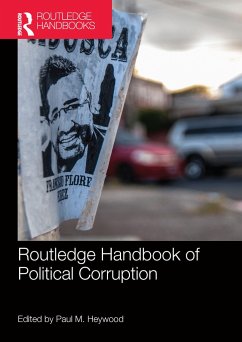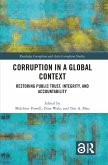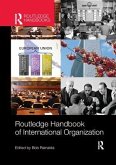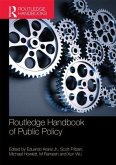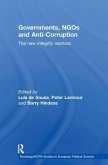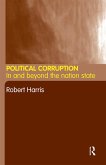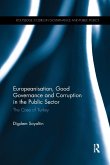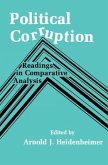Routledge Handbook of Political Corruption
Herausgeber: Heywood, Paul
Routledge Handbook of Political Corruption
Herausgeber: Heywood, Paul
- Broschiertes Buch
- Merkliste
- Auf die Merkliste
- Bewerten Bewerten
- Teilen
- Produkt teilen
- Produkterinnerung
- Produkterinnerung
Since the early 1990s, a series of major scandals in both the financial and most especially the political worlds has resulted in close attention being paid to the issue of corruption and its links to political legitimacy and stability. Corruption remains as widespread today, possibly even more so, as it did when concerted international attention started being devoted to the issue following the end of the Cold War. This Handbook provides a showcase to the most innovative and exciting research being conducted in the field of political corruption, as well as providing a new point of reference for all who are interested in the topic.…mehr
Andere Kunden interessierten sich auch für
![Corruption in a Global Context Corruption in a Global Context]() Corruption in a Global Context56,99 €
Corruption in a Global Context56,99 €![Routledge Handbook of International Organization Routledge Handbook of International Organization]() Routledge Handbook of International Organization66,99 €
Routledge Handbook of International Organization66,99 €![Routledge Handbook of Public Policy Routledge Handbook of Public Policy]() Routledge Handbook of Public Policy90,99 €
Routledge Handbook of Public Policy90,99 €![Governments, NGOs and Anti-Corruption Governments, NGOs and Anti-Corruption]() Governments, NGOs and Anti-Corruption73,99 €
Governments, NGOs and Anti-Corruption73,99 €![Political Corruption Political Corruption]() Robert HarrisPolitical Corruption29,99 €
Robert HarrisPolitical Corruption29,99 €![Europeanisation, Good Governance and Corruption in the Public Sector Europeanisation, Good Governance and Corruption in the Public Sector]() Digdem SoyaltinEuropeanisation, Good Governance and Corruption in the Public Sector56,99 €
Digdem SoyaltinEuropeanisation, Good Governance and Corruption in the Public Sector56,99 €![Political Corruption Political Corruption]() Political Corruption56,99 €
Political Corruption56,99 €-
-
-
Since the early 1990s, a series of major scandals in both the financial and most especially the political worlds has resulted in close attention being paid to the issue of corruption and its links to political legitimacy and stability. Corruption remains as widespread today, possibly even more so, as it did when concerted international attention started being devoted to the issue following the end of the Cold War. This Handbook provides a showcase to the most innovative and exciting research being conducted in the field of political corruption, as well as providing a new point of reference for all who are interested in the topic.
Produktdetails
- Produktdetails
- Verlag: CRC Press
- Seitenzahl: 380
- Erscheinungstermin: 13. März 2018
- Englisch
- Abmessung: 246mm x 174mm x 20mm
- Gewicht: 626g
- ISBN-13: 9781138594890
- ISBN-10: 113859489X
- Artikelnr.: 52209945
- Verlag: CRC Press
- Seitenzahl: 380
- Erscheinungstermin: 13. März 2018
- Englisch
- Abmessung: 246mm x 174mm x 20mm
- Gewicht: 626g
- ISBN-13: 9781138594890
- ISBN-10: 113859489X
- Artikelnr.: 52209945
Paul M. Heywood is Sir Francis Hill Professor of European Politics and Executive Dean of the Faculty of Social Sciences at the University of Nottingham, UK. Between 2003 and 2009 he was co-editor of the international journal Government and Opposition, and is currently Chair of the Board of Directors. He is author, co-author or editor of fourteen books and more than eighty journal articles and book chapters. His research focuses on political corruption, institutional design and state capacity in contemporary Europe. In 2006, he was appointed Adjunct Professor at the University of Hunan (China), where he is Senior Adviser to the Anti-Corruption Research Center. He is a Fellow of the Royal Society of Arts, a Fellow of the Academy of Social Sciences, and a Fellow of the Leadership Foundation for Higher Education.
1. Introduction: scale and focus in the study of corruption, Paul M Heywood
Section 1: Understanding corruption
2. The definition of political corruption, Mark Philp
3. Definitions of corruption, Oskar Kurer
4. The meaning of corruption in democracies, Mark Warren
5. The contradictions of corruption in Nigeria, Daniel J Smith
6. Criminal Entrepreneurship: a political economy of corruption and
organised crime in India, Andrew Sanchez Section 2: Causes
7. Causes of corruption, Bo Rothstein and Jan Teorrell
8. What does cross-national empirical research reveal about the causes of
corruption?, Daniel Triesman
9. Bureaucracy and corruption, Carl Dahlström
10. Sources of corruption in the European Union, Carolyn Warner Section 3:
Measurment
11. Measuring corruption, Paul M Heywood
12. The Silence of Corruption: Identifying Underreporting of Business
Corruption through Randomized Response Techniques, Nathan Jensen and Aminur
Rahman
13. Corruption and the problem of perception, Jonathan Rose
14. The ethnographic study of corruption: methodology and research focuses,
Davide Torsello
Section 4: Consequences
15. The consequences of corruption, Eric Uslaner
16. Corruption in Latin America: A View from the AmericasBarometer,
Mitchell A Seligson and Brian M Faughnan
17. Corruption and development: the mutable edges of morality in modern
markets, Sarah Bracking
18. Institutional design and anti-corruption in mainland China, Melanie
Manion
19. The political economy of conflicts of interest in an era of
public-private governance, Staffan Andersson and Frank Anechiarico Section
5: New directions
20. Reflection and Reassessment: The Emerging Agenda of Corruption
Research, Michael Johnston
21. Gender and corruption, Lena Wängnerud
22. Behavioral and Institutional Economics as an Inspiration to
Anticorruption - Some Counterintuitive Findings, Johann Graf Lambsdorff
23. Religion, Ethics and Corruption: Field Evidence from India and Nigeria,
Heather Marquette
24. The threats to sports and sports governance from betting-related
corruption: causes and solutions, David Forrest and Wolfgang Maennig
25. Freedom of information and corruption, Ben Worthy and Tom Mclean
Section 1: Understanding corruption
2. The definition of political corruption, Mark Philp
3. Definitions of corruption, Oskar Kurer
4. The meaning of corruption in democracies, Mark Warren
5. The contradictions of corruption in Nigeria, Daniel J Smith
6. Criminal Entrepreneurship: a political economy of corruption and
organised crime in India, Andrew Sanchez Section 2: Causes
7. Causes of corruption, Bo Rothstein and Jan Teorrell
8. What does cross-national empirical research reveal about the causes of
corruption?, Daniel Triesman
9. Bureaucracy and corruption, Carl Dahlström
10. Sources of corruption in the European Union, Carolyn Warner Section 3:
Measurment
11. Measuring corruption, Paul M Heywood
12. The Silence of Corruption: Identifying Underreporting of Business
Corruption through Randomized Response Techniques, Nathan Jensen and Aminur
Rahman
13. Corruption and the problem of perception, Jonathan Rose
14. The ethnographic study of corruption: methodology and research focuses,
Davide Torsello
Section 4: Consequences
15. The consequences of corruption, Eric Uslaner
16. Corruption in Latin America: A View from the AmericasBarometer,
Mitchell A Seligson and Brian M Faughnan
17. Corruption and development: the mutable edges of morality in modern
markets, Sarah Bracking
18. Institutional design and anti-corruption in mainland China, Melanie
Manion
19. The political economy of conflicts of interest in an era of
public-private governance, Staffan Andersson and Frank Anechiarico Section
5: New directions
20. Reflection and Reassessment: The Emerging Agenda of Corruption
Research, Michael Johnston
21. Gender and corruption, Lena Wängnerud
22. Behavioral and Institutional Economics as an Inspiration to
Anticorruption - Some Counterintuitive Findings, Johann Graf Lambsdorff
23. Religion, Ethics and Corruption: Field Evidence from India and Nigeria,
Heather Marquette
24. The threats to sports and sports governance from betting-related
corruption: causes and solutions, David Forrest and Wolfgang Maennig
25. Freedom of information and corruption, Ben Worthy and Tom Mclean
1. Introduction: scale and focus in the study of corruption, Paul M Heywood
Section 1: Understanding corruption
2. The definition of political corruption, Mark Philp
3. Definitions of corruption, Oskar Kurer
4. The meaning of corruption in democracies, Mark Warren
5. The contradictions of corruption in Nigeria, Daniel J Smith
6. Criminal Entrepreneurship: a political economy of corruption and
organised crime in India, Andrew Sanchez Section 2: Causes
7. Causes of corruption, Bo Rothstein and Jan Teorrell
8. What does cross-national empirical research reveal about the causes of
corruption?, Daniel Triesman
9. Bureaucracy and corruption, Carl Dahlström
10. Sources of corruption in the European Union, Carolyn Warner Section 3:
Measurment
11. Measuring corruption, Paul M Heywood
12. The Silence of Corruption: Identifying Underreporting of Business
Corruption through Randomized Response Techniques, Nathan Jensen and Aminur
Rahman
13. Corruption and the problem of perception, Jonathan Rose
14. The ethnographic study of corruption: methodology and research focuses,
Davide Torsello
Section 4: Consequences
15. The consequences of corruption, Eric Uslaner
16. Corruption in Latin America: A View from the AmericasBarometer,
Mitchell A Seligson and Brian M Faughnan
17. Corruption and development: the mutable edges of morality in modern
markets, Sarah Bracking
18. Institutional design and anti-corruption in mainland China, Melanie
Manion
19. The political economy of conflicts of interest in an era of
public-private governance, Staffan Andersson and Frank Anechiarico Section
5: New directions
20. Reflection and Reassessment: The Emerging Agenda of Corruption
Research, Michael Johnston
21. Gender and corruption, Lena Wängnerud
22. Behavioral and Institutional Economics as an Inspiration to
Anticorruption - Some Counterintuitive Findings, Johann Graf Lambsdorff
23. Religion, Ethics and Corruption: Field Evidence from India and Nigeria,
Heather Marquette
24. The threats to sports and sports governance from betting-related
corruption: causes and solutions, David Forrest and Wolfgang Maennig
25. Freedom of information and corruption, Ben Worthy and Tom Mclean
Section 1: Understanding corruption
2. The definition of political corruption, Mark Philp
3. Definitions of corruption, Oskar Kurer
4. The meaning of corruption in democracies, Mark Warren
5. The contradictions of corruption in Nigeria, Daniel J Smith
6. Criminal Entrepreneurship: a political economy of corruption and
organised crime in India, Andrew Sanchez Section 2: Causes
7. Causes of corruption, Bo Rothstein and Jan Teorrell
8. What does cross-national empirical research reveal about the causes of
corruption?, Daniel Triesman
9. Bureaucracy and corruption, Carl Dahlström
10. Sources of corruption in the European Union, Carolyn Warner Section 3:
Measurment
11. Measuring corruption, Paul M Heywood
12. The Silence of Corruption: Identifying Underreporting of Business
Corruption through Randomized Response Techniques, Nathan Jensen and Aminur
Rahman
13. Corruption and the problem of perception, Jonathan Rose
14. The ethnographic study of corruption: methodology and research focuses,
Davide Torsello
Section 4: Consequences
15. The consequences of corruption, Eric Uslaner
16. Corruption in Latin America: A View from the AmericasBarometer,
Mitchell A Seligson and Brian M Faughnan
17. Corruption and development: the mutable edges of morality in modern
markets, Sarah Bracking
18. Institutional design and anti-corruption in mainland China, Melanie
Manion
19. The political economy of conflicts of interest in an era of
public-private governance, Staffan Andersson and Frank Anechiarico Section
5: New directions
20. Reflection and Reassessment: The Emerging Agenda of Corruption
Research, Michael Johnston
21. Gender and corruption, Lena Wängnerud
22. Behavioral and Institutional Economics as an Inspiration to
Anticorruption - Some Counterintuitive Findings, Johann Graf Lambsdorff
23. Religion, Ethics and Corruption: Field Evidence from India and Nigeria,
Heather Marquette
24. The threats to sports and sports governance from betting-related
corruption: causes and solutions, David Forrest and Wolfgang Maennig
25. Freedom of information and corruption, Ben Worthy and Tom Mclean

